It’s an all action opening! Worf blows up a rock! Data spouts technobabble! Captain Picard looks serious and makes a split second decision that could save thousands of lives! Enjoy it, because it’s all downhill after the credits. For a start, the first post-credit scene establishes that this is an Alexander episode. And at the end of that scene, we discover its a Lwaxana Troi episode as well. Grit your teeth, it’s going to be a long three quarters of an hour…
Words
Since Peter Allan Fields had produced such a great Lwaxana Troi script in “Half a Life”, I’m sure the writing team was delighted to dump this duty on him a second time. Don’t be too hard on him... there is literally no writer on the planet who could have nailed this pairing between Lwaxana Troi and Alexander, and Fields does actually write some reasonable comedy scenes and an okay plot. The problem isn’t that he’s a bad screenwriter, it’s that the decision to add Alexander to the cast was ill-conceived and fails to supply anything helpful to the show beyond a perpetual source of vexation for Michael Dorn’s Worf (and let’s face it, we were not really short of those!).
Anyway, I’ll not complain about Fields’ work on this turkey of an episode, since later this very season he’s going to be partially responsible for one of the greatest Trek episodes ever. For now, however, we’re stuck with this one.
It was originally pitched to Rick Berman as ‘Auntie Mame arriving aboard and taking Worf’s son under her wing to bring him out of his shell in her own flamboyant way.’ Berman was sceptical. You can understand why. But the first draft reassured him, and it was put into production. However, the editing process went poorly, and the dialogue that Berman had enjoyed in the draft was dragged down in revision after painful revision.
Fields himself was unhappy that the writing team inserted the nitrium parasite B-story, considering it to fit very badly with the story he’d been working on. He’s not wrong. It’s also yet another ‘Enterprise suffers inexplicable malfunctions’ plot, and we’ve seriously had enough of those at this point.
There’s an amusing scene in Act Four that was shot but then later cut from the final episode for length where Worf and Troi commiserate together:
Troi sits with a confused, disconsolate Worf. She, too, seems a bit downtrodden... as weary of dealing with her mother as Worf is of coping with Alexander.
WORF: I do not understand. I have been very clear with the boy as to his obligations. And yet -- he continues to ignore me.
TROI: I know what you mean. I’ve been quite clear with my mother about her not interfering with Alexander... but she does what she wants in spite of it.
There is a beat as the two of them reflect on their strangely shared experience.
WORF: When I was six years old, I listened to what my parents said. I obeyed their rules.
She casts him a look. He turns away.
WORF: Most of the time.
A beat, as she remembers.
TROI: When I was six, she gave me a birthday party. Halfway through it, she disappeared... and finally came back dressed as a Koropian princess... carried in a sedan chair by four young men. It was mortifying.
WORF: My mother would not have done that.
TROI: It seems that all my life I've felt like I’m the parent... and my mother is the child... I wonder why I’m at such a loss to put a stop to it?
WORF: And I wonder why I have lost control of Alexander.
Troi leans forward.
TROI: You know... it’s been said that grandparents and grandchildren get along so well because they have a common enemy.
Worf gives a half smile. Troi smiles back.
It’s somewhat ironic that a scene that adds some backstory to our main cast is cut to make room for a main story that focuses on guest stars.
Anyway, we may not have much fun with this episode, but director Winrich Kolbe apparently did enjoy making it:
It’s a fast-moving show, and it was slightly different because we had comedic elements in there. It gave us a different pace. These shows could be rather boring if they all go with the same direction, same philosophy, same sets, same actors. After a while, you just want to throw up your hands and say, ‘OK, guys, you know what to do.’ You want to go to the director of photography and say, ‘Just shoot the damn thing. You can reach me at my home number.’
He later confessed that the episode was “fluff, but nice fluff”. That’s a pretty good summary.
Acting Roles
Majel Barrett and Brian Bonsall are both fine in this episode, it’s really not their performances that let it down, it’s that we just don’t care about any of this material.
Michael Dorn’s Worf rescues this from complete disaster by being a brilliant straight man, a point of view I share with Rick Berman about this episode.
And we're overrun with forgettable guest stars. Closest to memorable are Tony Jay as Campio (left), and Patrick Cronin as Protocol Master Erko (right).
You might remember Jay as Dougie Milford in Twin Peaks, but if not you've almost certainly heard his voice in something as he has around a hundred and fifty voice credits in cartoons and videogames - not to mention the voice of the Supreme Being in Terry Gilliam’s Time Bandits. Cronin has a career of bit parts and a few recurring roles, and is one of very few TNG guest stars to appear twice in L.A. Law in the same role (for what it's worth, before appearing in TNG).
There’s a host of forgettable guest stars on the holodeck too.
Albie Sleznick’s Juggler is entertaining, at least, and they get him back twice for Voyager.
George Ede’s Poet is less impressive (and that wig is terrible), although Ede’s two dozen roles include appearing in the movies Serpico and The World According to Garp, which is more than the majority of this week’s cast can claim. Most of the rest of these bit parts didn't even get a screen credit for their appearances.
One of those who went uncredited was Larry A. Hankin who played the Wind Dancer.
Looks like a forgettable performance, I know, but Hankin had nearly two hundred roles in a variety of shows and movies going back to 1966, and you undoubtedly have seen him in some of them. They get him back for Voyager too, where he appears three times as the holographic pool hustler Gaunt Gary (oh, and he was in L.A. Law one year before this episode was filmed). But the thing you're most likely to recognise him as is his five appearances as Mr Heckles in Friends, the downstairs neighbour who was always asking them to ‘keep the noise down’. Strange but true!
This episode is also the last appearance of Carel Struycken as Mr. Homn.
They don’t give him much to do, but he’s always good fun all the same.
Models, Make-up, and Mattes
It’s actually been quite a while since we saw someone enter the holodeck with a composite shot! Not since season three’s “Hollow Pursuits”, unless I’m mistaken.
And the holodeck sequence is full of special effects it’s impossible to be excited about, like this one. Triangular fire, woo.
The one person who was thrilled about all this was make-up designer Michael Westmore:
Thanks to the holodeck, I never knew what sort of characters I’d be called upon to create. There was a fire sculptor, who had an elaborate set of head appliances; the dancer, whose entire body had to be painted; and the poet, whose wig and beard were made of rope. We literally used dyed hemp for his hair, hand-laying each strand. And we had a lot of fun doing the juggler, who wore a nosepiece, and had ears that wrapped around his head – an idea I’d had for a long time. For a more whimsical look, we added spiked hair and eyebrows that grew up in the centre of his forehead.
What's more, this episode won two Emmys, one for Robert Blackman in Outstanding Individual Achievement in Costume Design for a Series and one for Outstanding Individual Achievement in Makeup for a Series. This puts it alongside “The Best of Both Worlds” and “All Good Things...”, which also achieved these lofty heights of Emmy success. This is literally the best thing that can be said about this episode.






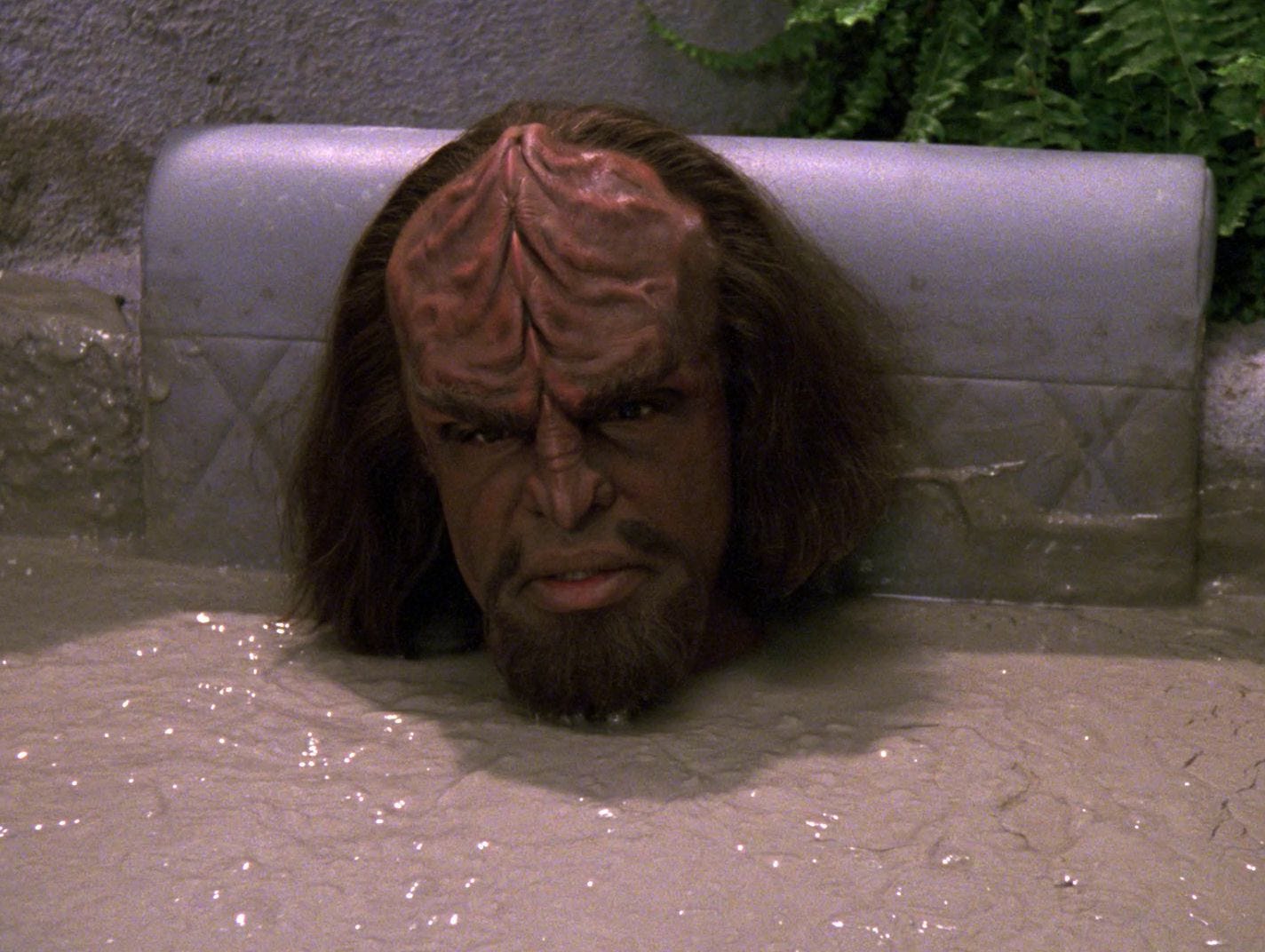
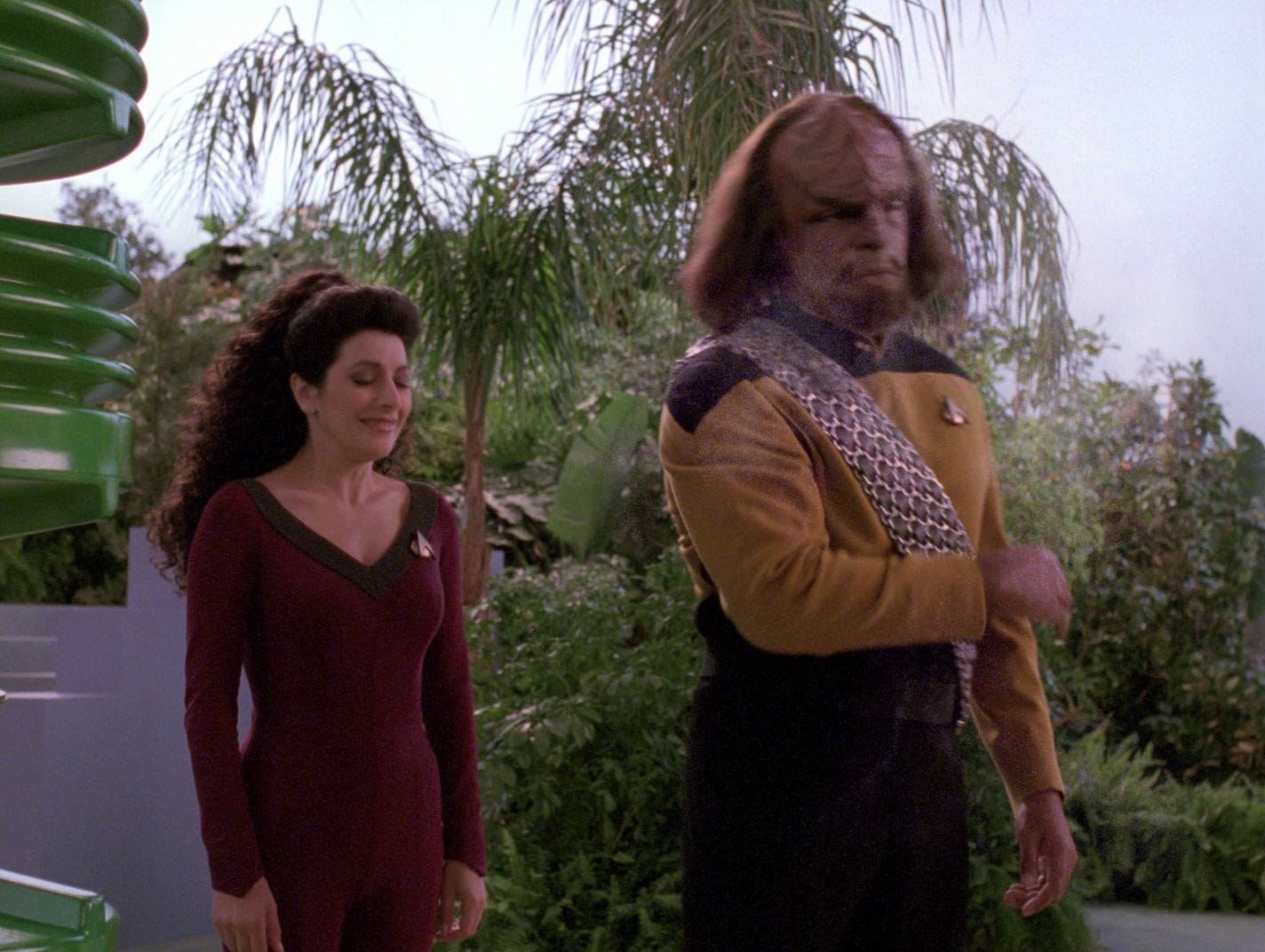
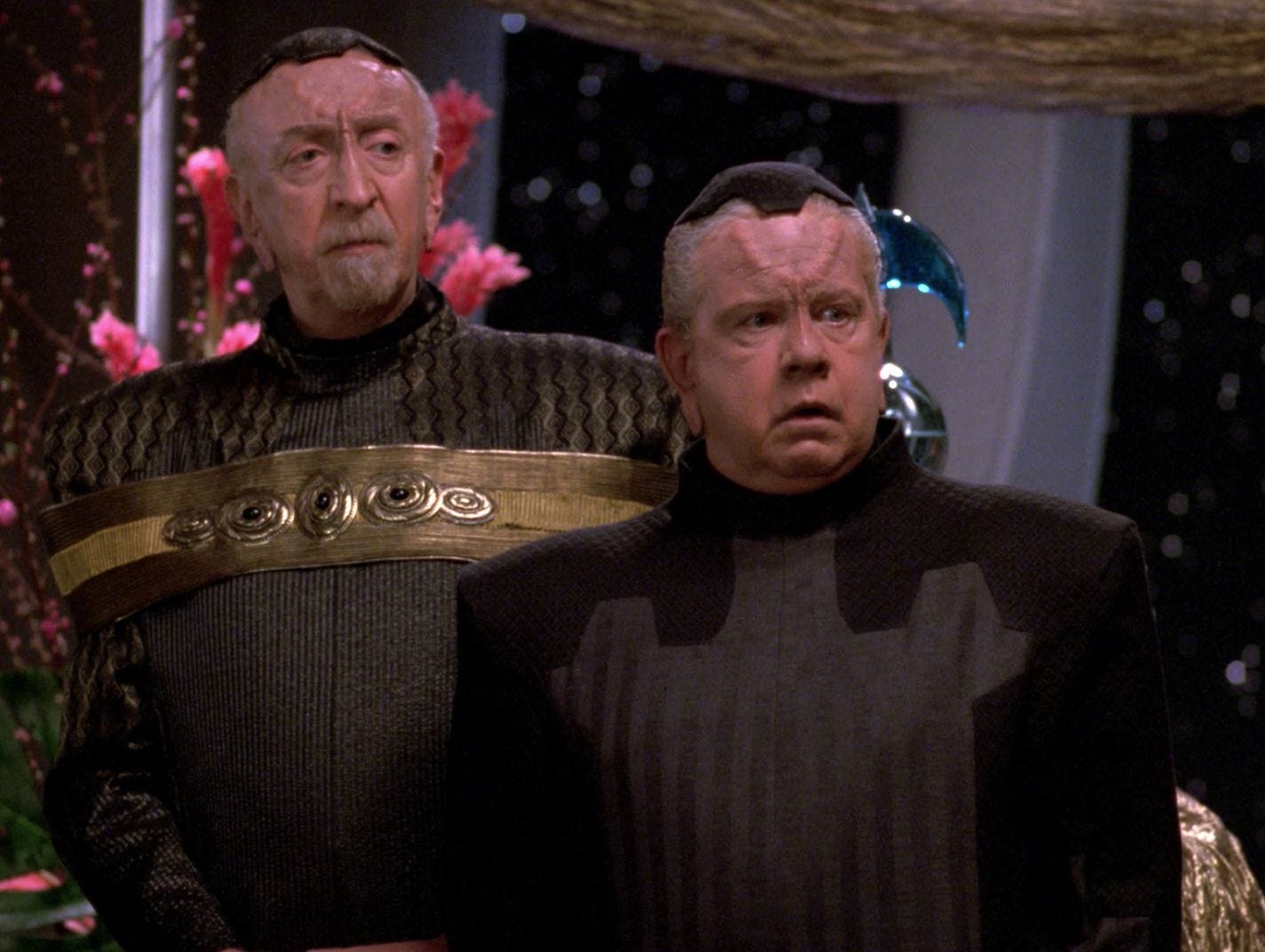



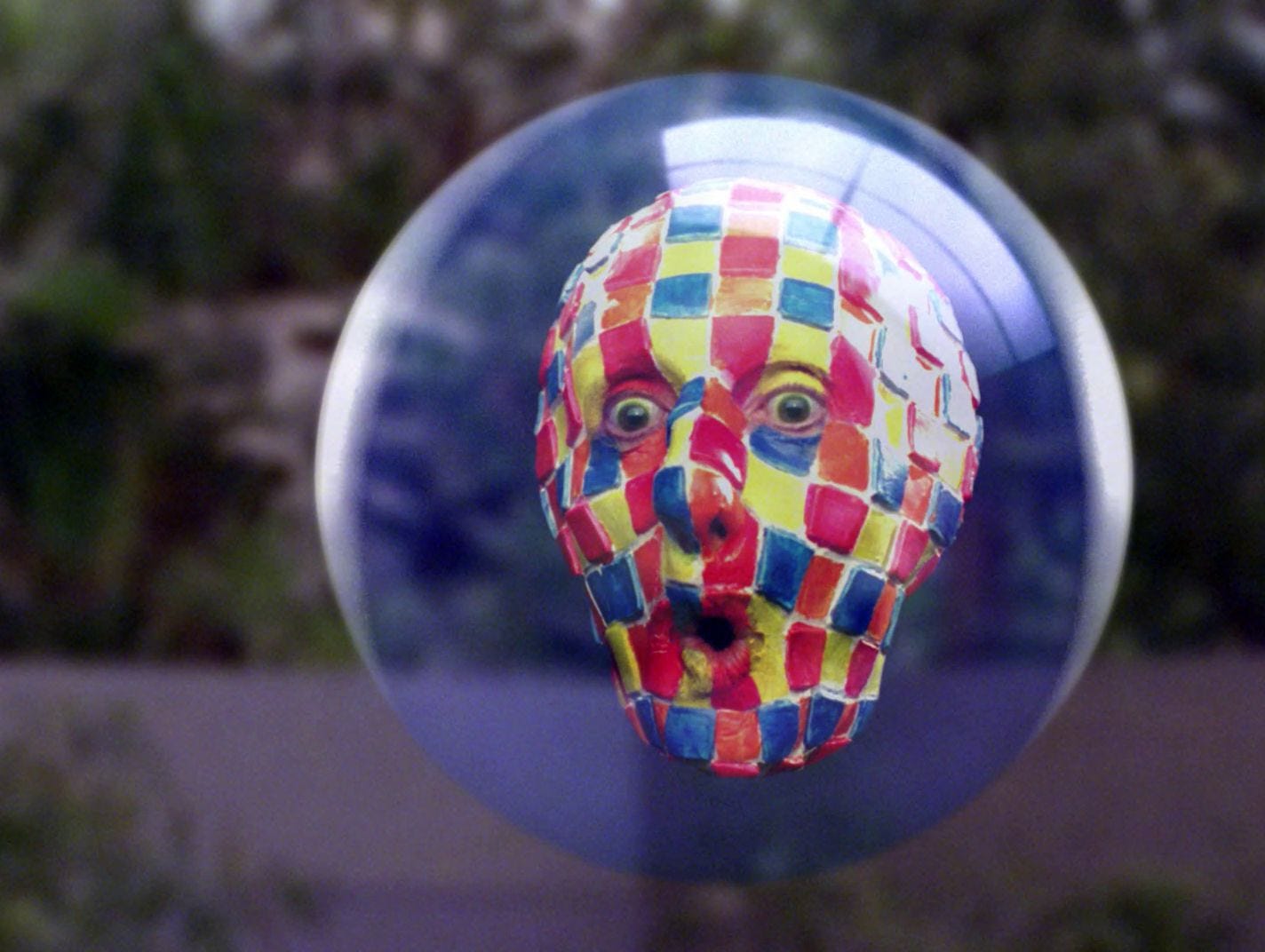
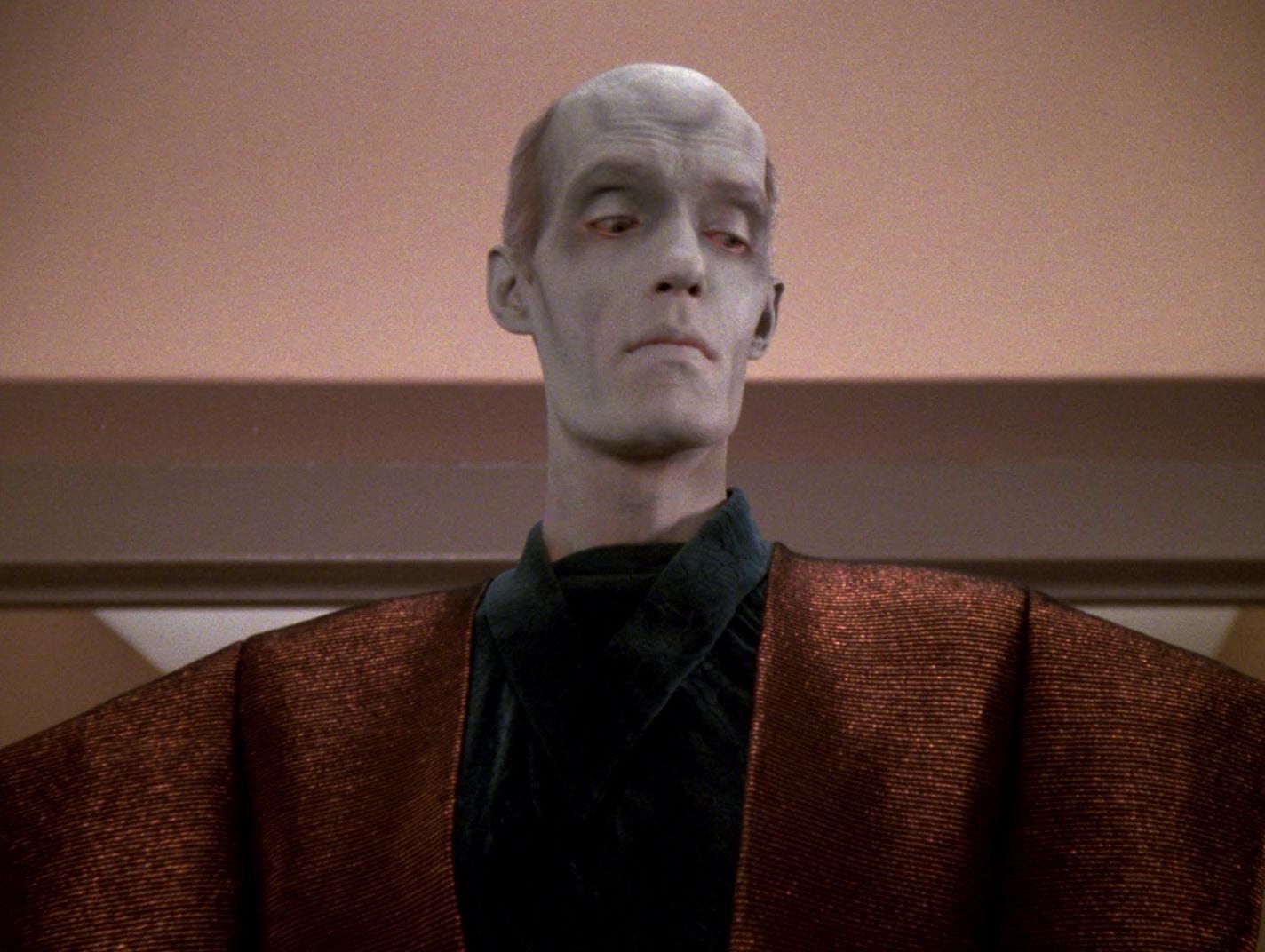
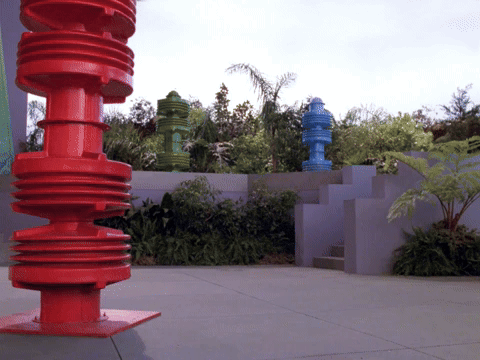

Ok, so it’s not one of the greats, but I’ve always been very fond of it. The higher, the fewer!
Straight man Worf does a lot of heavy lifting in this episode but it's worth it just for him. Worf in the mud bath is priceless.